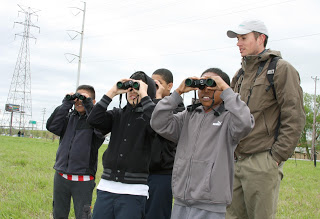
It was a chilly May 12th, cloudy and windy as well. But 29 sixth graders from West Side Middle School in East Chicago, Indiana came to nearby Roxana Marsh to experience what the outdoors has to offer, learn new things, help with the cleanup and restoration of the natural area, and enjoy the afternoon.
Roxana Marsh is part of the larger Grand Calumet River Area of Concern, which has been undergoing dredging through the Great Lakes Legacy Act over the past six years. The marsh section of the project was completed three years ago with the removal of 600,000 cubic yards of sediment.
This accomplishment was celebrated with a press event attended by government officials and local school children. Those middle schoolers left their legacy in perennial plants that are now thriving along the marsh. This year’s class is the third group of gardeners in what may well become an annual tradition.
In addition to planting natives, the students learned the basics of birding, explored the small community of life in sediment, and manned trash bags for garbage detail. There were water beetles, egrets, killdeer, toads, dragonfly nymphs, and more to experience.
Throughout their afternoon tour, the 6th graders were guided by experts from Audubon Chicago Region, U.S. EPA, The Nature Conservancy, Shirley Heinz Land Trust, Indiana’s departments of Natural Resources and Environmental Management, Northwest Indiana Regional Planning Commission, Dunes Learning Center, and Illinois-Indiana Sea Grant.
Last June, she took part in a one-day workshop at Purdue University Calumet, which introduced the Helping Hands curriculum to 25 local educators. Helping Hands activities are ideally suited to schools in Areas of Concern that are going through the cleanup process—they provide opportunities to directly engage students in the larger project. The workshop also included a visit to several sites on the Grand Cal to see the dredging work in progress as well to walk around a finished site—Roxana Marsh.
 “The cleanup and restoration of the Grand Calumet River is brightening the northwest Indiana landscape,” she explained. “This work transforms space into places that students can visit, perform stewardship work, and develop pride in their local environment. Environmental educators teach students that nature is in their backyard, but for these students, high quality nature is in their backyard, right here in East Chicago, Indiana.”
“The cleanup and restoration of the Grand Calumet River is brightening the northwest Indiana landscape,” she explained. “This work transforms space into places that students can visit, perform stewardship work, and develop pride in their local environment. Environmental educators teach students that nature is in their backyard, but for these students, high quality nature is in their backyard, right here in East Chicago, Indiana.”



